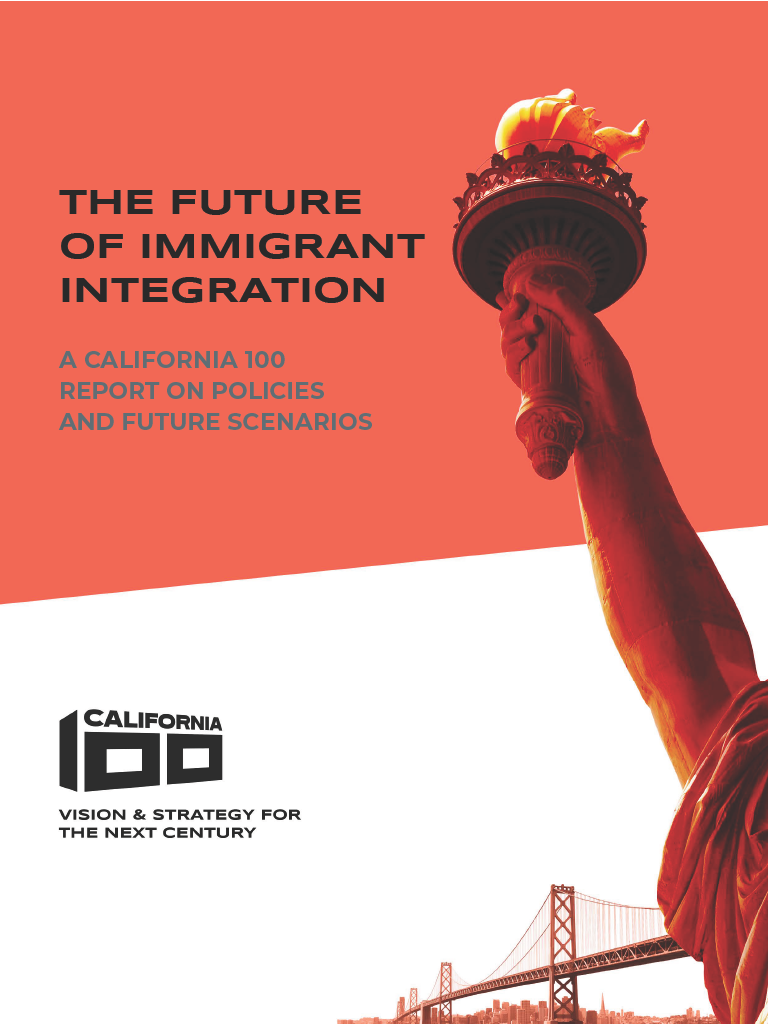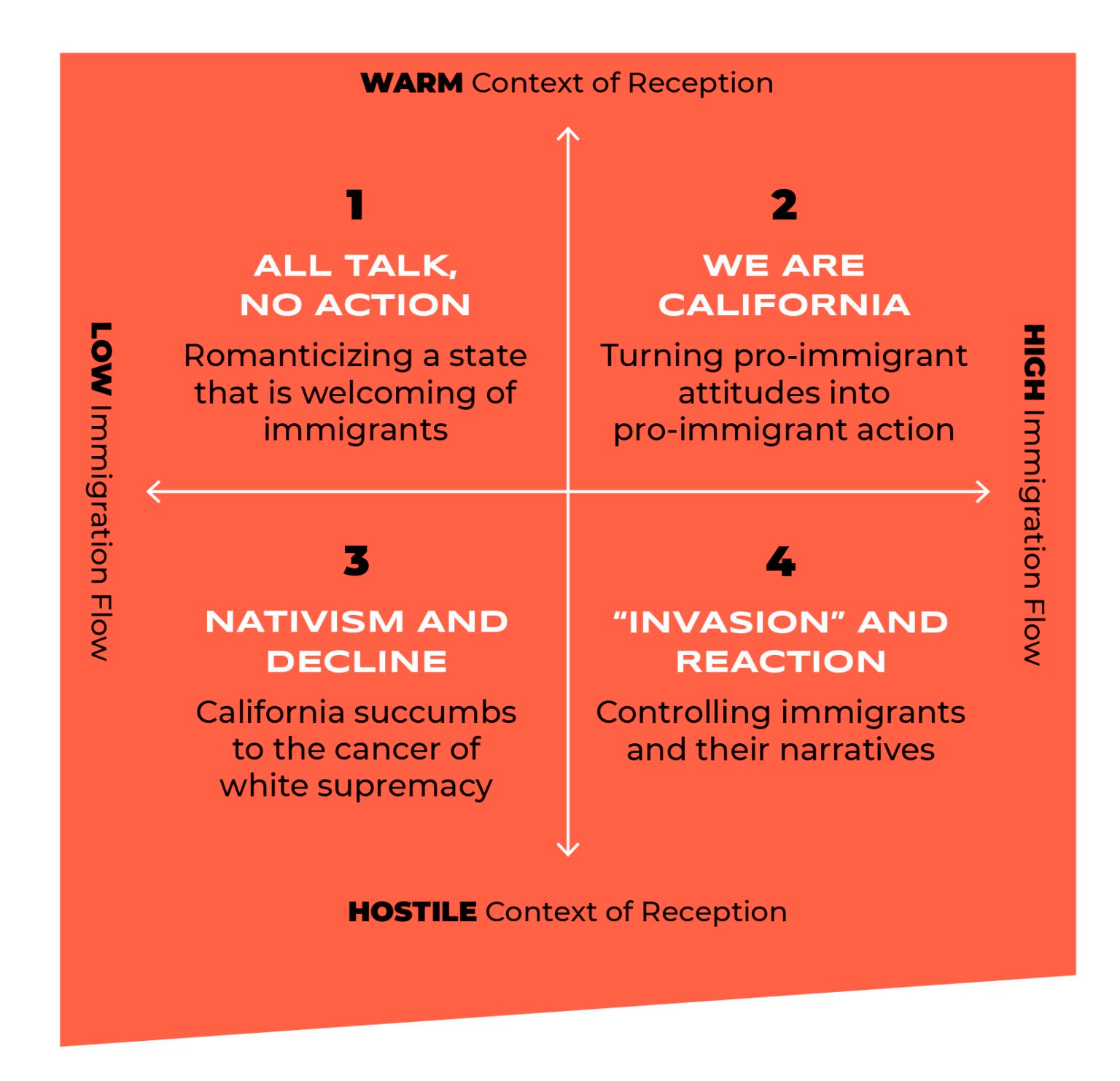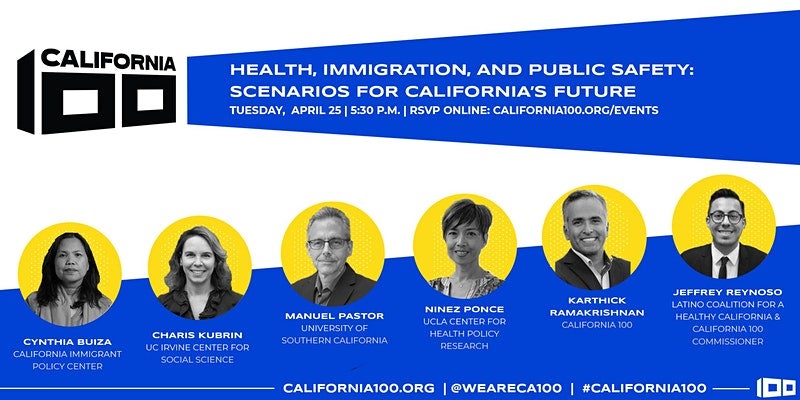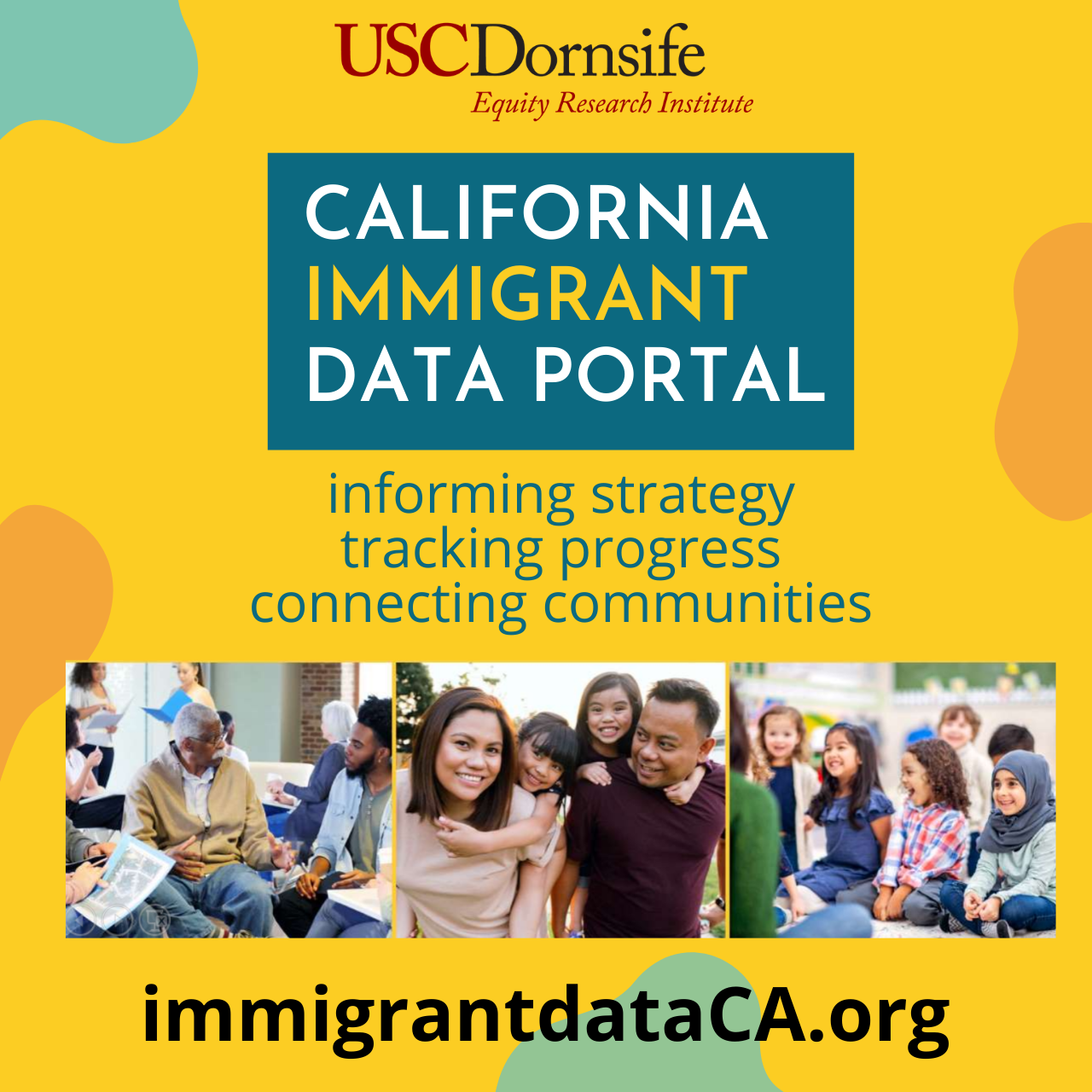April 25, 2022
What would immigrant integration look like in California 100 years from now? What will future changes mean for current and future generations of Californians, and how can we make sure that California’s future in immigrant integration remains innovative, resilient, inclusive, sustainable, and equitable?
Thai V. Le (Turpanjian Postdoctoral Fellow in Civil Society and Social Change, USC Equity Research Institute) and Manuel Pastor (Director, USC ERI) led a research team in examining where California has been, where it’s at, and where it’s headed when it comes to possible immigrant integration scenarios and policy alternatives for the future. The research team conducted extensive primary and secondary research, and spoke with a wide array of experts in the public and private sectors to examine possible scenarios and policy options for future-focused action.
The Future of Immigrant Integration Policy and Scenario report by USC ERI is funded by the California 100 Initiative as one of the reports being released by the Initiative across 13 different policy domains for the future of California in 2022.

Immigrant Integration and the Future of the Golden State
California is often thought of as an immigrant-rich state, and for good reasons. Over one-quarter of the state’s population is foreign-born, one-third of the workforce is immigrant, and nearly half of California’s children have at least one immigrant parent. Yet California’s world is changing—the foreign-born share of the population has been on the decline for the past several years and has been shrinking for much longer in places like Los Angeles and San Francisco. California now has the most settled immigrant population in the nation, as measured by years spent in the United States.
Because of these immigrant population shifts—fewer inflows from abroad, the growth of the second generation, and the more settled nature of the foreign born—important tasks in the decades ahead center on encouraging the successful integration of immigrants and ensuring that there will be enough future immigration to continue fueling California’s prosperity. Immigrant integration can be defined by immigrants’ economic mobility, civic participation, and how open the receiving society is to them, or their “warmth of welcome.” But California’s immigrant integration agenda stands at a crossroads. After decades of being a primary immigrant destination, the state’s share of foreign-born residents is on the decline. California has earned a well-deserved reputation for shifting to more welcoming policies in the last two decades, but integration challenges remain, and common-ground issues like high housing prices and soaring economic inequality are increasingly prompting immigrants to choose other states.

About California 100
California 100, incubated at the University of California and Stanford University, released its next three policy and scenario reports focusing on the future of health and wellness, immigrant integration and public safety in the golden state. In July, California 100 announced grants to 18 centers and institutes across California to examine future scenarios with the potential to shape California’s leadership in the coming century, with a focus on 13 priority research areas (listed below). In March, California 100 released its first four policy and scenario reports focused on the future of advanced technology, energy, housing, and transportation.
These research reports were produced as part of California 100’s research stream of work led by Henry E. Brady, PhD, Director of Research for California 100, current professor, and former Dean of the Goldman School of Public Policy.
California 100 announced its diverse and intergenerational Commission in October and its Advisory Council in December. California 100’s core mission is to strengthen California’s ability to collectively solve problems and shape our long-term future—through research, policy innovation, advanced technology, and engagement—by identifying, mobilizing, and supporting champions for innovative and equitable solutions.
Event: California 100, April 25, 2022
California 100 to Release Reports on the Future of California’s Health, Immigrant Integration, and Public Safety
You’ve heard of the future of work. What about the future of health & wellness? The future of immigrant integration? The future of public safety?
Join California 100, a new statewide initiative being incubated at the University of California and Stanford University, in unveiling issue and future scenario reports focused on these policy areas involving the future of health, immigrant integration, and public safety in California. On April 25, 2022 at 5:30pm at the Ronald Reagan UCLA Medical Center , California 100 research partners will discuss their findings and possible scenarios for the future in a panel discussion. Following the panel discussion, California 100 will host a light reception for in person attendees to further engage with our panelists and learn more about the new initiative.
Panelists include the following California 100 research partners:
- Cynthia Buiza, California Immigrant Policy Center
- Dr. Charis Kubrin, UCI School of Social Ecology
- Dr. Manuel Pastor, USC Equity Research Institute
- Dr. Ninez Ponce, UCLA Center for Health Policy Research
- Dr. Jeffrey Reynoso, Latino Coalition for a Healthy California
- Dr. Karthick Ramkarishnan, California 100 Executive Director & Event Moderator
The goal of California 100 is to lift up and support transformative ideas, people and projects that accelerate progress with a focus on inspiring a vision and strategy for California’s next century that is innovative, sustainable, and equitable. In addition to sponsoring original work, the California 100 Platform will promote the best of what is happening in California. Through these various projects and activities, California 100 seeks to move California towards an aspirational vision—changing policies and practices, attitudes and mindsets, for a more vibrant future. In total, California 100 will release 15 issue & future scenarios reports throughout the Spring and Summer of 2022.
USC Equity Research Institute (ERI) Releases Future of Immigrant Integration Report Examining Possible Scenarios and Policy Alternatives for California’s Future
On April 25, 2022, the USC Equity Research Institute released a new report, The Future of Immigrant Integration Policy and Scenario Report, made possible by a grant from the California 100 Initiative. A research team led by Postdoctoral Fellow Thai V. Le and Manuel Pastor examined where California has been, where it’s at, and where it’s headed when it comes to possible scenarios and policy alternatives for the future.
“California’s immigrant integration agenda stands at a crossroads. After decades of being an immigrant hub, the state’s share of foreign-born residents is on the decline even as we need more workers and entrepreneurs to fuel our prosperity. While the state has moved far from the xenophobia that triggered Proposition 187 in 1994, a more welcoming tone is not enough to address the challenges standing in the way of full immigrant inclusion,” said Manuel Pastor, USC ERI Director.
The report findings show that immigrants in California are facing significant challenges in their integration and inclusion. Thai V. Le, USC ERI Postdoctoral Fellow, said immigrants are, on average, faring worse than U.S.-born Californians across “several indicators, including wage earnings, rent and housing burden, the digital divide, and access to healthcare. Disaggregating these outcomes by status, we find especially stark differences with undocumented immigrants often at the bottom.” For example, among full-time workers in the state, undocumented immigrants have a median hourly wage half of what U.S.-born Californians make.
“Such disparities threaten the livelihood of our fellow Californians. We have to understand that undocumented immigrants—even in the façade of a welcoming state—do not have the same opportunities and safeguards as other Californians,” said Thai V. Le. “So, as we move forward to become a more immigrant-inclusive state, we have to be intentional in bringing to the table all immigrant voices and putting forth policies that uplift and empower all immigrants. Otherwise, we may find ourselves further purporting a ‘good’ immigrant and ‘bad’ immigrant narrative by unjustly judging who is deserving of the opportunities to thrive in the Golden State.
The research offers four alternative scenarios for the state’s future and provides policy options.

Click here to read the full findings in Future of Immigrant Integration Policy and Scenario Report to learn more about the four scenarios.
Manuel Pastor said, “Addressing the challenges of immigrant integration in California means changing policy, changing power, and changing perspective. The state needs to couple welcoming words with action on more accessible and meaningful opportunities—for education, employment, and housing—that would benefit all Californians, including immigrant families.”
“After months of diligent research by our partners across the state, we are excited to share their findings with the public to kickstart a conversation about the policy options we can take to create an inclusive, equitable and sustainable California,” said Karthick Ramakrishnan, PhD, executive director of California 100. “Our research partners engaged a diverse group of stakeholders in their work and it will take all of them and all of us to take this work and make it actionable today–to influence tomorrow.”
California Immigrant Data Portal
Launched in October 2020, the California Immigrant Data Portal serves as a resource and data tool for immigrants and those serving immigrant communities across the state of California. This portal presents data and case studies that can be used to better understand and promote the well-being of immigrants, their families, and their communities.





